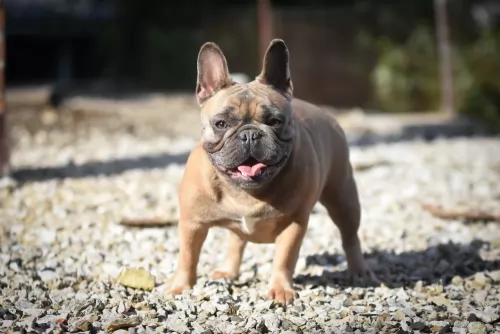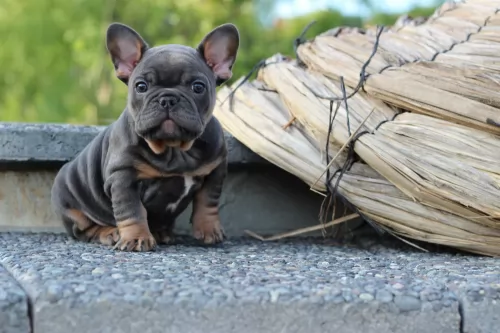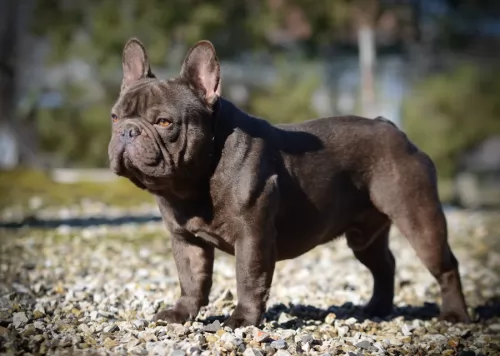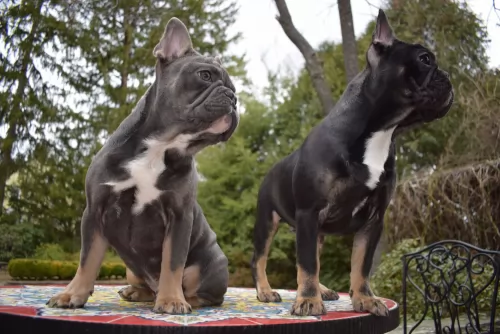 Petzlover
PetzloverFrench Bulldog is originated from France but Bull and Terrier is originated from United Kingdom. French Bulldog may grow 15 cm / 5 inches shorter than Bull and Terrier. French Bulldog may weigh 8 kg / 17 pounds lesser than Bull and Terrier. Both French Bulldog and Bull and Terrier has almost same life span. French Bulldog may have less litter size than Bull and Terrier. Both French Bulldog and Bull and Terrier requires Low Maintenance.
 The french bulldog originated in England and are bred expecting small size bulldogs. Many lace workers in Nottingham had little bulldogs and when they emigrated to france, they brought their dogs with them. Soon they become popular in France and Europe. Then Americans showed interest in them.In 1896 frenchie was shown in United states in a show and after that they got their nickname "Frechie".
The french bulldog originated in England and are bred expecting small size bulldogs. Many lace workers in Nottingham had little bulldogs and when they emigrated to france, they brought their dogs with them. Soon they become popular in France and Europe. Then Americans showed interest in them.In 1896 frenchie was shown in United states in a show and after that they got their nickname "Frechie".
The Bull and Terrier is a blend between a number of Old English Terriers and the Old English Bulldog. It is believed that this extinct dog was the start of breeds such as the American Pit Bull Terrier and the Staffordshire Bull Terrier.
They were excellent for hunting rats and weren’t a true breed. The dog was popular in the British Isles and in the United States in the 19th Century. They became rare as different varieties of Bull and Terrier were bred and standardized.
Most terriers have a good deal of Old English Bulldog blood in them so as to provide them with the courage to fight and hunt prey, while the English Terrier blood provided a feisty temperament and longer legs for speed.
Around 1860, the Bull and Terrier breed split into 2 categories – the pure white Bull Terrier and the ones of color. The Bull and Terrier was never recognized as a standardized breed by any of the kennel clubs.
 Frenchie is a good companion dog and has a powerful muscular body. They like to play but also likes to relax for more time. They are intelligent and training them is very easy until they think it a game. They are free thinkers and are not very good in obedience. Frenchies should not be leaved alone for a long time.They love spending time with humans and generally they get along with everyone. They are excellent watchdogs and alerts when strangers come.
Frenchie is a good companion dog and has a powerful muscular body. They like to play but also likes to relax for more time. They are intelligent and training them is very easy until they think it a game. They are free thinkers and are not very good in obedience. Frenchies should not be leaved alone for a long time.They love spending time with humans and generally they get along with everyone. They are excellent watchdogs and alerts when strangers come.
French bulldog suits very well in apartments. But they should be made to walk for fifteen minutes daily to avoid over weight. They should not be kept outside on hot days. Frenchies will be very happy if you stay in home. They will follow you wherever you walk inside the house. They love people so much, such that people who own a Frenchie can not imagine life without them.
There isn’t too much detail and information on the Bull and Terrier but we can be sure that with the cross between the Old English Bulldog and the Old English Terrier, he would have been a small to medium sized compact, muscular dog, standing roughly between 38cm to 50cm in height and weighing anything in the region of 11 to 22kg.
He would have had a big head, and most of the dogs had a medium to long tail. His coat was of many colors such as white, fawn, tan or brindle and would have been short and smooth.
As far as temperament goes, the Bull and Terrier would certainly be courageous, feisty, independent, strong and energetic. Socialization wasn’t available in those days but with training, this intelligent breed would be affectionate with his human family.
 They are good children friendly dogs as they like to play with them. It will be good if they are supervised by an adult.
They are good children friendly dogs as they like to play with them. It will be good if they are supervised by an adult.
They are polite with everyone including other pets. They love to play games and chase balls but don't need much exercise.
Frenchies adapts well for apartment living but they don't like being alone for long time. They will not tolerate both hot and cold weather and so air conditioning will be better.
French Bulldogs are easy to train and are very much interested in playing.
Nobody seems to be 100% sure when the classic Bull and Terrier dog became extinct but it is strongly assumed that it was some time between 1890 and 1920.
People believe that there are actually surviving breeds that could be considered Bull and Terriers. One thing is sure, when you consider that the Bull and Terrier is actually made up of several breeds such as the Bull Terrier, the Staffordshire Bull Terrier, Boston Terrier and American Pit Bull Terrier then you can imagine the character of the dog – brave, hardy, intelligent, feisty, bold, confident and fearless. He was a dog who loved his human family and would have been both friend and protector.
These dogs have been popular around the world, and have had a strong influence in the development of a number of other breeds. Even today, breeders are always looking at ways to develop new breeds based on the descendants of the Bull and Terrier.
 Frenchies can suffer from Von Willebrand's disease(VWD)and thyroid condition. Due to their flat faces they suffer from elongated soft palate or cleft palate. Because of their compacted air way they have inability to effectively regulate temperature.
Frenchies can suffer from Von Willebrand's disease(VWD)and thyroid condition. Due to their flat faces they suffer from elongated soft palate or cleft palate. Because of their compacted air way they have inability to effectively regulate temperature.
Any indication that the hair is unhealthy, such as brittleness and hair loss, should be addressed immediately to avoid any further damage. Hair loss becomes a problem when it becomes excessive, possibly due to disease or a particular condition.
The Bull and Terrier was no doubt a robust breed with few health issues. However his owners of that time would have had to be aware of eye diseases such as cataracts that could have lead to blindness.
Other health issues they would have had to contend with would have been hip and elbow dysplasia, a disease which can cause lameness in a dog accompanied with pain. Because the Bull and terrier was mixed with the English Bulldog, the dog owners would have had to be aware of respiratory health problems, as the Bull dog is a breed that is susceptible to these problems.
 As with all dogs, proper nutrition makes your French Bulldog a happy, healthy pup. He should have his own food and water bowls. Don't feed your French bulldog puppy, uncooked meat or food that may have gone bad. Young puppies need relatively large amount of food in order to meat the demands of their rapidly growing bodies and their hectic lifestyle. Feed your puppy specially designed chewing treats from reputable pet stores.
As with all dogs, proper nutrition makes your French Bulldog a happy, healthy pup. He should have his own food and water bowls. Don't feed your French bulldog puppy, uncooked meat or food that may have gone bad. Young puppies need relatively large amount of food in order to meat the demands of their rapidly growing bodies and their hectic lifestyle. Feed your puppy specially designed chewing treats from reputable pet stores.
According to the French BullDog Club of America, there are no specific guidelines for feeding them. Options for feeding your French Bulldog are commercial dry food, canned food, raw food and homemade meals. Calories required for frenchie varies depending on size, age, activity level and metabolism.
Frenchies can be made to walk or run for a particular distances. Heavy exercises should not be given as they face respiratory problems. Avoid exercising them in hot weather as they have chances of getting heatstroke.
Long ago the Bull and Terrier was developed to be a hunting dog, and because he was a blend of the English Bulldog and Terriers such as the Staffordshire Bull Terrier and English Terrier, he no doubt had a short coat that would have required being brushed down from time to time.
The Bull and Terrier dog was bred for hunting, and he would have in all likelihood have caught some of his own food. He would therefore have got a lot of protein in. His owners would also have fed him some of their own food too which would have been eggs, home-made bread, rice, fresh vegetables and meat.
He would have had a good quota of raw meat in his diet too and this would have ensured that his coat was shiny and glossy, free of rashes. Dogs such as the Bull and Terrier wouldn’t have eaten commercially produced kibble as that was only introduced in the 1930s.